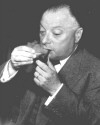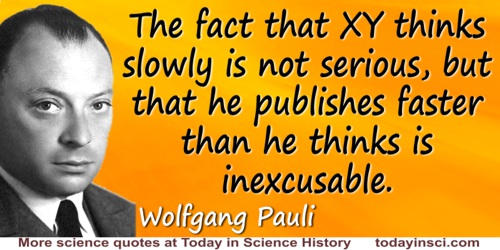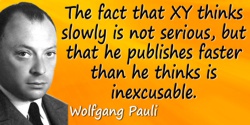 (source)
(source)
|
Wolfgang Pauli
(25 Apr 1900 - 15 Dec 1958)
Austrian-American physicist who established the Pauli exclusion principle.
|
Science Quotes by Wolfgang Pauli (14 quotes)
[Maria Goeppert Mayer is] the Madonna of the Onion.
— Wolfgang Pauli
As her friend, Pauli, reverently dubbed her, because of her assumption that the protons and neutrons of a nucleus could be found in shells of different energies—like the layers of an onion. As given, without citation, in Joan Dash, A Life of One’s Own: Three Gifted Women and the Men They Married (1973), 196.
After reading a paper by a young theoretical scientist, Pauli, shaking his head sadly, commented:
Das ist nicht einmal falsch.
That is not even wrong.
Das ist nicht einmal falsch.
That is not even wrong.
— Wolfgang Pauli
Attributed.
Ich weiss viel. Ich weiss zu viel. Ich bin ein Quantengreis
I know a great deal. I know too much. I am a quantum ancient.
I know a great deal. I know too much. I am a quantum ancient.
— Wolfgang Pauli
As quoted by Isidor Rabi in interview with Jeremy Bernstein for article, 'Physicist' The New Yorker (1970). Collected in Jeremy Bernstein, 'Rabi: The Modern Age', Experiencing Science (1978), 102. Both the original German and the translation come from Rabi.
~~[Attributed]~~ That theory is worthless. It isn’t even wrong!
— Wolfgang Pauli
Probably a feral variant of “This isn’t right. This isn’t even wrong,” which can only be cited as “Attributed,” since there is no known primary source.
I confess, that very different from you, I do find sometimes scientific inspiration in mysticism … but this is counterbalanced by an immediate sense for mathematics.
— Wolfgang Pauli
Letter to Niels Bohr (1955). Quoted in Robert J. Scully, The Demon and the Quantum (2007), 7.
I do not mind if you think slowly. But I do object when you publish more quickly than you think.
— Wolfgang Pauli
As quoted, without citation, in William H. Cropper, Great Physicists: The Life and Times of Leading Physicists from Galileo to Hawking (2001), 257.
I have done a terrible thing: I have postulated a particle that cannot be detected.
— Wolfgang Pauli
After postulating the existence of the neutrino, a particle with no mass and no electric charge, in order to balance an equation. In an article in Mercury, 29, 29, it is stated, without citation, that “the day after making the proposal Pauli told his colleague Walter Baade.” Webmaster has looked, but not yet found a primary source. Can you help?
Physics is very muddled again at the moment; it is much too hard for me anyway, and I wish I were a movie comedian or something like that and had never heard anything about physics.
— Wolfgang Pauli
Letter to R. Kronig (21 May 1925). Quoted in R. Kronig, 'The Turning Point', in M. Fierz and V. F. Weisskopf (eds.), Theoretical Physics in the Twentieth Century. A Memorial Volume to Wolfgang Pauli (1960),as trans. in M. Klein, Letters on Wave Mechanics, x.
The fact that XY thinks slowly is not serious, but that he publishes faster than he thinks is inexcusable.
— Wolfgang Pauli
Quoted in Ralph Oesper, The Human Side of Scientists (1975), 154.
The kinetic concept of motion in classical theory will have to undergo profound modifications. (That is why I also avoided the term “orbit” in my paper throughout.) … We must not bind the atoms in the chains of our prejudices—to which, in my opinion, also belongs the assumption that electron orbits exist in the sense of ordinary mechanics—but we must, on the contrary, adapt our concepts to experience.
— Wolfgang Pauli
Letter to Niels Bohr (12 Dec 1924), in K. von Meyenn (ed.), Wolfgang Pauli - Wissenschaftliche Korrespondenz (1979), Vol. 1, 188. Quoted and cited in Daniel Greenberger, Klaus Hentschel and Friedel Weinert, Compendium of Quantum Physics: Concepts, Experiments, History and Philosophy (2009), 615.
The natural scientist is concerned with a particular kind of phenomena … he has to confine himself to that which is reproducible … I do not claim that the reproducible by itself is more important than the unique. But I do claim that the unique exceeds the treatment by scientific method. Indeed it is the aim of this method to find and test natural laws…
— Wolfgang Pauli
In Aufsätze und Vorträge über Physik und Erkenntnistheorie (1961), 94. Quoted in Erhard Scheibe and Brigitte Falkenburg (ed), Between Rationalism and Empiricism: Selected Papers in the Philosophy of Physics (2001), 276
There can never be two or more equivalent electrons in an atom, for which in a strong field the values of all the quantum numbers n, k1, k2 and m are the same. If an electron is present, for which these quantum numbers (in an external field) have definite values, then this state is ‘occupied.’
— Wolfgang Pauli
Quoted by M. Fierz, in article ‘Wolfgang Pauli’, in C. C. Gillispie (ed.), Dictionary of Scientific Biography (1974), Vol. 10, 423.
To us … the only acceptable point of view appears to be the one that recognizes both sides of reality—the quantitative and the qualitative, the physical and the psychical—as compatible with each other, and can embrace them simultaneously … It would be most satisfactory of all if physis and psyche (i.e., matter and mind) could be seen as complementary aspects of the same reality.
— Wolfgang Pauli
From Lecture at the Psychological Club of Zurich (1948), 'The Influence of Archetypal Ideas on the Scientific Theories of Kepler', collected in Writings on Physics and Philosophy (1994), 260, as translated by Robert Schlapp.
What really matters for me is … the more active role of the observer in quantum physics … According to quantum physics the observer has indeed a new relation to the physical events around him in comparison with the classical observer, who is merely a spectator.
— Wolfgang Pauli
Letter to Niels Bohr (1955). Quoted in Robert J. Scully, The Demon and the Quantum (2007), 22.
Quotes by others about Wolfgang Pauli (2)
It is well known that theoretical physicists cannot handle experimental equipment; it breaks whenever they touch it. Pauli was such a good theoretical physicist that something usually broke in the lab whenever he merely stepped across the threshold. A mysterious event that did not seem at first to be connected with Pauli's presence once occurred in Professor J. Franck's laboratory in Göttingen. Early one afternoon, without apparent cause, a complicated apparatus for the study of atomic phenomena collapsed. Franck wrote humorously about this to Pauli at his Zürich address and, after some delay, received an answer in an envelope with a Danish stamp. Pauli wrote that he had gone to visit Bohr and at the time of the mishap in Franck's laboratory his train was stopped for a few minutes at the Göttingen railroad station. You may believe this anecdote or not, but there are many other observations concerning the reality of the Pauli Effect!
From Thirty Years That Shook Physics: The Story of Quantum Theory (1966), 64. Note the so-called Pauli Effect is merely anecdotal to provide humor about supposed parapsychology phenomena in coincidences involving Pauli; it should not be confused with scientifically significant Pauli Exclusion Principle.
Pauli … asked me to tell him what was happening in America. I told him that Mrs. Wu is trying to measure whether parity is conserved. He answered me: “Mrs. Wu is wasting her time. I would bet you a large sum that parity is conserved.” When this letter came I already knew that parity is violated. I could have sent a telegram to Pauli that the bet was accepted. But I wrote him a letter. He said: “I could never let it out that this is possible. I am glad that we did not actually do the bet because I can risk to lose my reputation, but I cannot risk losing my capital.”
In Discussion after paper presented by Chien-Shiung Wu to the International Conference on the History of Original Ideas and Basic Discoveries, Erice, Sicily (27 Jul-4 Aug 1994), 'Parity Violation' collected in Harvey B. Newman, Thomas Ypsilantis (eds.), History of Original Ideas and Basic Discoveries in Particle Physics (1996), 381.
See also:
- 25 Apr - short biography, births, deaths and events on date of Pauli's birth.
- No Time to be Brief: A Scientific Biography of Wolfgang Pauli, by Charles P. Enz. - book suggestion.


 In science it often happens that scientists say, 'You know that's a really good argument; my position is mistaken,' and then they would actually change their minds and you never hear that old view from them again. They really do it. It doesn't happen as often as it should, because scientists are human and change is sometimes painful. But it happens every day. I cannot recall the last time something like that happened in politics or religion.
(1987) --
In science it often happens that scientists say, 'You know that's a really good argument; my position is mistaken,' and then they would actually change their minds and you never hear that old view from them again. They really do it. It doesn't happen as often as it should, because scientists are human and change is sometimes painful. But it happens every day. I cannot recall the last time something like that happened in politics or religion.
(1987) -- 


